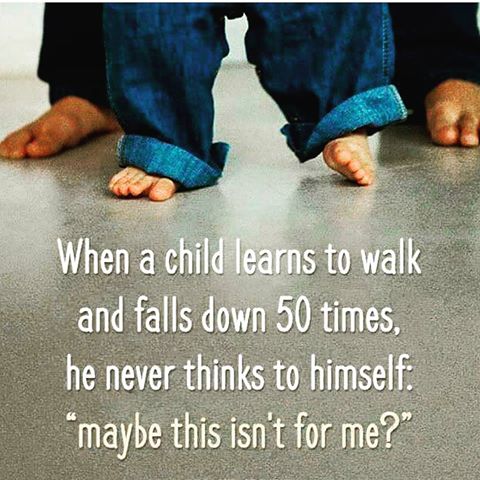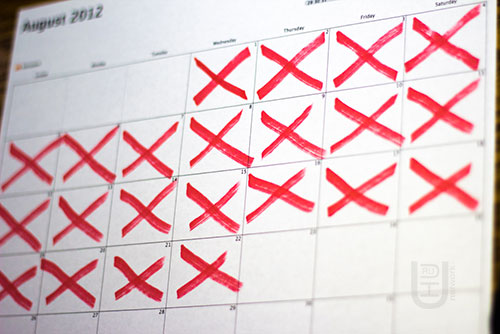They say Thomas Edison failed 1000 times before he made the lightbulb, J.K Rowling was rejected by 12 publishers and Henry Ford ruined his reputation with failed automobile ventures. What was the thing that made these people keep going? Why didn’t they just say, ‘maybe this isn’t for me’?

Ever get that feeling like you’re a million steps behind where you should be? Lately, it seems like I’ve just been walking through a river of set backs. I mean I wouldn’t call it ‘failure’, but just things where I know I could have done better. I was talking with my mentor about it and he told me that the only real failure is giving up. It’s a very cliche line I guess, but it got me thinking.
Scott Adams, the founder of Dilbert said ‘failure is a resource’ in a Wall Street Article,
“If I find a cow turd on my front steps, I’m not satisfied knowing that I’ll be mentally prepared to find some future cow turd. I want to shovel that turd onto my garden and hope the cow returns every week so I never have to buy fertilizer again. Failure is a resource that can be managed.”
When I started looking, there were a lot of things people had said about failure. Someone even wrote a book called ‘Being Wrong’, and there are a million articles about ‘the science of failure’. So, I read about 30 said articles and began to think, alright, how do I use this as an opportunity?
The latest example of a set back for me was the $5 resource challenge. We wee given 2 weeks and $5 to make as much money as possible. We made hardly anything. Even writing that out just makes me want to backspace and start writing about a new topic. But I won’t- because then I would have just failed at learning from my failures.
At first, I blamed the amount of time we were allocated- 2 weeks was not nearly enough time. Then we blamed the fact that we were all really busy and could never find time to meet. Then we started blaming other team members. It’s very easy to shift the mechanism of failure onto to another source- funny how we NEVER do that with success. So why didn’t we succeed?
Well, it wasn’t that our ideas were particularly bad, the main reason they didn’t happen was because we weren’t putting in enough effort. The task slipped down the priority list and nothing was done well. I think that was the main reason. We did a lot of things, sure. But did we do anything well? When met with resistance or a slight obstacle, we just left it and tried to start all over again.

For example, one of our ideas was to have a tower building contest. The date and location was set and our posters had been put up. Sam began to set up the contest in a high-traffic area and almost straight away, a staff member from Monash told him to shut it down. There were rules about that certain piece of area that meant no student activities could happen in that exact place. This of course meant that Sam had to leave the area- but didn’t really mean he couldn’t try set up somewhere else. A ‘successful’ approach would have been to learn from the failure and try again. But we didn’t, we just let that idea go and tried to move onto the next one.
I guess reflection on things like these are really useful- I mean we did have some successes along the way as well. And to be honest, for the amount of time we actually put into it, it was a miracle that we made any money at all.
What we didn’t do was think outside the box, take advantage of opportunities, communicate efficiently and plan our time well. In an article by Belle Beth Cooper ‘Why highly successful people crave failure‘, she lists out some strategies for making the most of failure. One of the best strategies she presented was keeping a journal of successes, and a journal of failures. Once you start to acknowledge exactly what happened to make things go wrong and what happened to make things go right, you’ll start to notice a pattern and be able to avoid doing the things that caused the failures in the first place.
Something I noticed which was a recurring theme was the a lack of motivation. We procrastinated and relied too heavily on other team members to pick up the slack. While I was reading, I stumbled across Jerry Seinfeld’s ‘Don’t Break The Chain‘ method of keeping your motivation.
He explained that to become a good [insert thing you want to be good at], is to do one thing that will help you refine your craft every day. He said what he wanted to do was write 10 jokes a day- it didn’t matter if it the jokes were good or bad, he just wanted to write 10 jokes. So he got one of those calendars where all of the days of the year were on one page and every day he completed his task of 10 jokes, he crossed out the day with a big ‘X’. He said he was motivated by the chain he started to create. He wanted the chain of X’s to be unbroken and it started to seem harder to allow himself to break the chain and have all that effort go to waste than to just write 10 jokes. So that’s how he became so successful, after a year he had a stockpile of over 3000 jokes.

So, in our next meeting, we’ve scheduled time to figure out the one thing we all need to do every day to be better at the team position we’ve been allocated. For example, I’m marketing and design. So every day, I’m going to aim to design one screenshot of our app and read one article on tech marketing. Hopefully, we’ll end up with an amazing aesthetic for our app, and be able to market it successfully.
I’ll let you know how it goes!